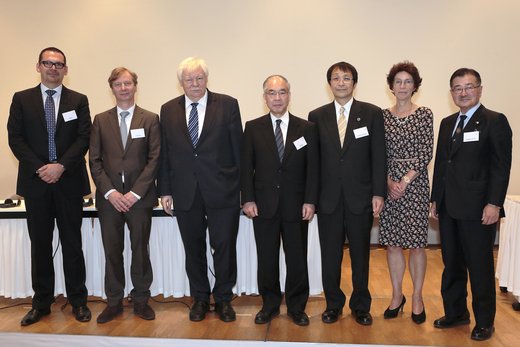The increasing call for direct applicability bears the risk of losing sight of the long-term goals of research, studies and teaching. This was the conclusion arrived at by the delegates to the fourth joint conference of the German Rectors’ Conference (HRK), the Japanese-German Center Berlin (JDZB) and the Japan Committee of Universities for International Exchange (JACUIE) held in Berlin last week.
160 experts from Japan and Germany – including 60 university leaders – discussed how innovation and benefits to society can be seen in the context of the various academic disciplines and how universities in Japan and Germany can react to society’s expectations without abandoning their actual mission. On the basis of a systemic definition of innovation, they agreed upon three guiding principles that, in their opinion, should be applied with regard to the successful interaction of universities and society:
• Comprehensive, academically sound education and training form the basis for innovation and societal progress. This not only includes the communication of specialist knowledge and professional competencies but the development of a mature personality whose actions are guided by ethical principles.
• The diversity of specialist disciplines must be maintained in its current quality. At the same time, transdisciplinary and trans-sectoral cooperation must be promoted at all levels and on a permanent basis.
• Both funding programmes and the criteria used to assess university performance must be appropriate for the character and the demands of research and higher education.
HRK President Prof. Dr. Horst Hippler said: “Higher education must not be reduced to conveying knowledge, and research is more than generating results that can be quickly turned to practical use. Time as a student should also be a time of personal development. A stable democracy and a sustainably successful economy need responsible-minded academics who have the widest possible perspective. These are aspects that politics and business should bear in mind when articulating their demands on higher education institutions.”
His Japanese colleague Prof. Dr. Nagata Kyosuke, chairman of JACUIE, noted: “We need research, technology and people with the ability to adapt to change. But simply adapting isn’t enough. People ought to develop sciences and technologies that can take society into the future. The members of our society expect this of our universities, and rightly so. They are the places which encourage a broad spectrum of academic research, based on free thinking, and the individuality and creativity of researchers and students.”
To the full text of the joint declaration by the HRK, JDZB and JACUI
Press Release
University representatives from Japan and Germany: Guiding principles for successful interaction of universities and society
6. July 2016

